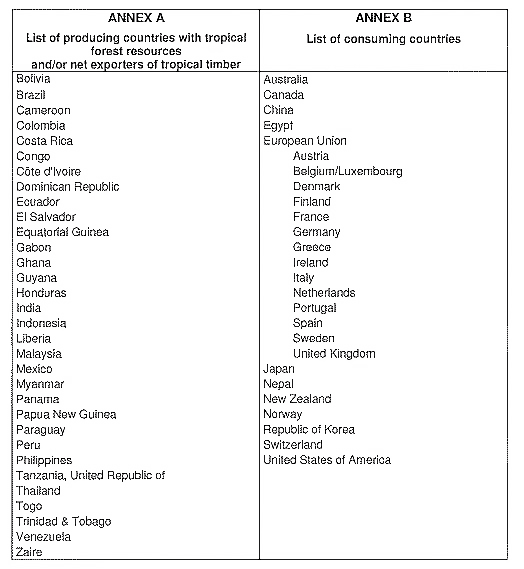The world´s leading consumer and producer countries of tropical timber will meet in Geneva from 26 to 30 July under UNCTAD auspices to negotiate a successor agreement to the International Tropical Timber Agreement (ITTA), 1994.
The Agreement is aimed at providing a framework for consultation, international cooperation and policy development among producing and consuming countries on "all relevant aspects" of the world timber economy. It is intended to contribute to sustainable development and to enhance exports of tropical timber and timber products "from sustainably managed sources".
The current Agreement, which was adopted in 1994 and entered into force in 1997, is due to expire on 31 December 2005. It is administered by the International Tropical Timber Organization (ITTO, www.itto.or.jp), established for that purpose in 1986. Based in Yokohama, Japan, ITTO occupies a unique position in the family of intergovernmental organizations. Like all commodity organizations it is concerned with trade and industry, but like an environmental agreement it also pays considerable attention to the sustainable management of natural resources. Its activities currently range from R&D and market intelligence to wood processing, reforestation and forest management.
Virtually all the countries involved in world trade in tropical timber will be represented at the conference (see annexed lists of the 33 producing countries and 26 consuming countries that are members of the current Agreement). A number of intergovernmental and non-governmental organizations active in tropical timber trade and environmental issues will also attend. Members of the 1994 Agreement represent about 80% of the world´s tropical forests and 90% of the $10-billion global tropical timber trade. The tropical forest industry and related trade employ hundreds of thousands of people and make large contributions to export earnings in some of the world´s poorest countries, such as Central African Republic, Guyana and Myanmar.
Intensive preparatory work for a new agreement has taken place in the course of three meetings over the past year. A working document containing the Preparatory Committee´s proposals for the new text was finalized by the Committee´s Chairperson and Vice-Chairperson last April and is before the Conference in document TD/TIMBER.3/4.
Participating as observers in the work of the ITTO, and in next week´s negotiations, are the organization´s Trade Advisory Group, comprising representatives of the private sector, and an open-ended Civil Society Advisory Group (CSAG), both of which serve to channel their respective views and concerns into the deliberations. At the Conference, the CSAG will present five principles it hopes to see reflected in the new Agreement. These principles acknowledge the "legitimate rights and interests" of indigenous peoples and other local communities in achieving sustainable forest management and trade, particularly with regard to land and resource use and tenure.
The amount of forest land that is locally owned or managed has more than doubled over the past 15 years, and now represents 22% of all forests in the developing world, according to Forest Trends (www.forest-trends.org), one of the NGOs participating in the CSAG. The World Bank estimates that about 25% of the world´s poor make their living from forests. Local forest management not only provides a livelihood for numerous indigenous peoples and other local communities that are increasingly marketing their own forest products and services and contributing to value-added; it also strengthens biodiversity. The CSAG maintains that such peoples and communities should receive greater financial incentives for encouraging both conservation and trade in forest products, thereby contributing to the Millennium Development Goals of environmental sustainability and poverty reduction. In addition, they are calling for greater international efforts to stop illegal logging activities that exploit local forest communities while also robbing the planet of precious natural resources.
Background on tropical timber agreements
Negotiations on the first tropical timber agreement began in the early 1980s amidst increasing worldwide concern for the fate of tropical forests. While there was almost universal alarm over the rate of deforestation in many tropical countries, there was also considerable agreement that the tropical timber trade was crucial to their economic development. The international community was being asked to take action, granting equal importance to conservation and trade. Drafters of the first text believed that a flourishing trade in tropical timber, if based on a well-managed forest resource, could be a key to sustainable development, providing valuable foreign exchange and employment while also protecting natural forests from destruction, degradation and excision. The first ITTA that eventually came into force in 1985 was no conventional commodity agreement. It was as much an agreement for forest conservation and development as for trade.
The 1994 Agreement builds on the 1985 treaty, focusing on the world tropical timber economy and the sustainable management of the resource base, and encouraging the timber trade and improved forest management. It also contains broader provisions for information-sharing, including data on non-tropical timber trade, and allows for the consideration of non-tropical timber issues as they relate to tropical timber.
UNCTAD´s role
The United Nations Conference for the Negotiation of a Successor Agreement to the International Tropical Timber Agreement, 1994 is being organized by UNCTAD in the Palais des Nations. One of UNCTAD´s key mandates in the field of commodities is to facilitate cooperation between commodity producers and consumers and support the work of international commodity bodies. This mandate was reinforced most recently in the São Paulo Consensus adopted at UNCTAD XI (13-18 June 2004,www.unctadxi.org), which calls on UNCTAD to "help to build effective partnerships among relevant stakeholders aiming at viable solutions and sustainable approaches to commodity problems". The São Paulo conference also launched an International Task Force for Commodities, one of whose main tasks will be to re-evaluate the role of international commodity agreements in the international commodity economy.
ANNEX
Table



